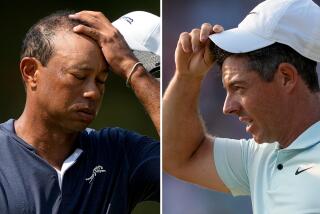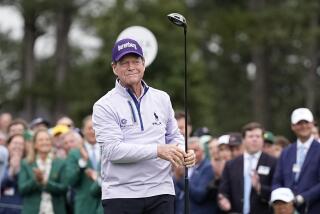SPORTS EXTRA / RYDER CUP : TEE for TWO : Suddenly, There’s a Fervor Rarely Seen in Golf and It’s All About Validation : The Best Golfers From the United States and Europe Have Turned the Ryder Cup Into One of Sport’s Most Intense Rivalries
- Share via
BROOKLINE, Mass. — The golf course is the last place you’d expect to find this much emotion and fervor.
Somehow, the genteel world of golf, that bastion of civility and sportsmanship, now lays claim to this country’s most significant biennial international competition.
If the four years between Summer Olympics are too long for you to go without waving a flag and chanting “U-S-A!” the Ryder Cup is for you.
It’s hard to get too excited about the Winter Olympics, which are often no more than figure skating exhibitions and people sliding down frozen hills.
The end of the Cold War took the edge off matchups with the former Soviet Union and Eastern Bloc countries.
America is the lone remaining superpower, the dominant country of the 20th century. And yet Americans still feel the need to validate themselves through sports.
Lately, golf is the best vehicle. The Ryder Cup, pitting the best Americans against the best Europeans, has exploded into a widely watched, pressure-packed, money-making spectacle.
Why? Because Americans can’t stand losing when we’re not supposed to.
Sometimes American teams have to be the best for us to show interest. No one would care about Brandi Chastain or her sports bra right now if her American soccer team had not won the Women’s World Cup.
Sometimes, too much domination becomes boring. America has sent NBA players to the last two Olympics, and the concept already seems old and tiresome. We didn’t feel passionate about the Ryder Cup, either, when the United States held the trophy for 24 years.
But then the Europeans won or retained the Cup in five of the next seven matches and ohhhh baby, now it’s on.
The television coverage has tripled in the last decade, from nine hours in 1989 to 27 hours this year. An average of 30,000 fans a day and more than 1,000 reporters will swarm the grounds of the Country Club for the 33rd Ryder Cup. Celebrities such as Michael Jordan are expected to join the crowd.
The American team went out to dinner Monday night and a throng of fans pressed their faces up to the restaurant’s windows.
When fans line up just to watch the participants eat, an event is officially accorded big-time status.
Most people agree that the revitalized American interest in the Ryder Cup and the escalation of the rivalry began at Kiawah Island, S.C., in 1991.
The United States was in the midst of a summer-long celebration of the victory in the Gulf War, with cities trying to top each other by throwing bigger and better parades for the soldiers.
The little technicality that European countries were America’s allies during the Gulf War didn’t seem to matter. They were Them and not Us. And they had held the Cup since 1985.
That 1991 Ryder Cup was contentious, sometimes even mean-spirited, on the part of the players and the galleries. The United States regained the Cup, narrowly winning, 14 1/2-13 1/2, and then went over to England two years later and successfully defended it.
But Europe has claimed the last two, most recently in 1997 at Valderrama in Sotogrande, Spain.
This shouldn’t be happening.
The U.S. team that went to Spain in ’97 featured the reigning Masters, British Open and PGA Championship winners. But they couldn’t get it done.
This year’s team features nine of the top 14 players in the world rankings.
The fans didn’t plunk down $375 a ticket--for those lucky enough to get them at face value--and the corporations didn’t drop $250,000-$500,000 for hospitality tents to watch the home team lose.
“It’s terribly important for us [to win],” U.S. captain Ben Crenshaw said. “I think everyone knows that for our side, [after] not having success in the last few occasions.”
Everyone knows it, but not every player seems to care as deeply as the fans or Crenshaw.
The players brought up the compensation issue and let that become the lead story in the months leading up to the Ryder Cup.
Tiger Woods said, “It would be nice to win” here, but said he would not let a U.S. defeat ruin his stellar, six-victory year.
David Duval was asked about his sense of patriotism and responded by listing his responsibility to represent himself, his teammates, his captain, co-captains, the PGA of America before he got around to American golfers.
Justin Leonard seemed more excited by the novelty of playing with teammates than the honor of playing for country.
Some of the older players seem to be a little more willing to represent the U.S.
“For me, it’s a big factor,” Jeff Maggert said. “It’s really the main reason we’re all here, to test American golfers’ skills against the skills of the European golfers. And it’s not about money, and it’s not about anything else but ‘Let’s see if the American players can beat the European players.’ And there’s a lot of pride in your country. It’s a big motivation factor for me and for all the players.”
Sometimes it appears playing against the United States means more than playing for it. After all, the European players come from nations as diverse as Scotland, Spain and Sweden, yet they seem better able to come together for a common cause. It’s the international equivalent of “Beat L.A.”
There will be more agendas than golf balls on the grounds of the Country Club this weekend.
Players seeking glory. Captains seeking validation. Sponsors seeking exposure. Everyone seeking money.
The nation’s sports fans will be drawn to the drama about to unfold. It’s hard to believe so much care and interest can fit into a little white ball.
More to Read
Go beyond the scoreboard
Get the latest on L.A.'s teams in the daily Sports Report newsletter.
You may occasionally receive promotional content from the Los Angeles Times.










